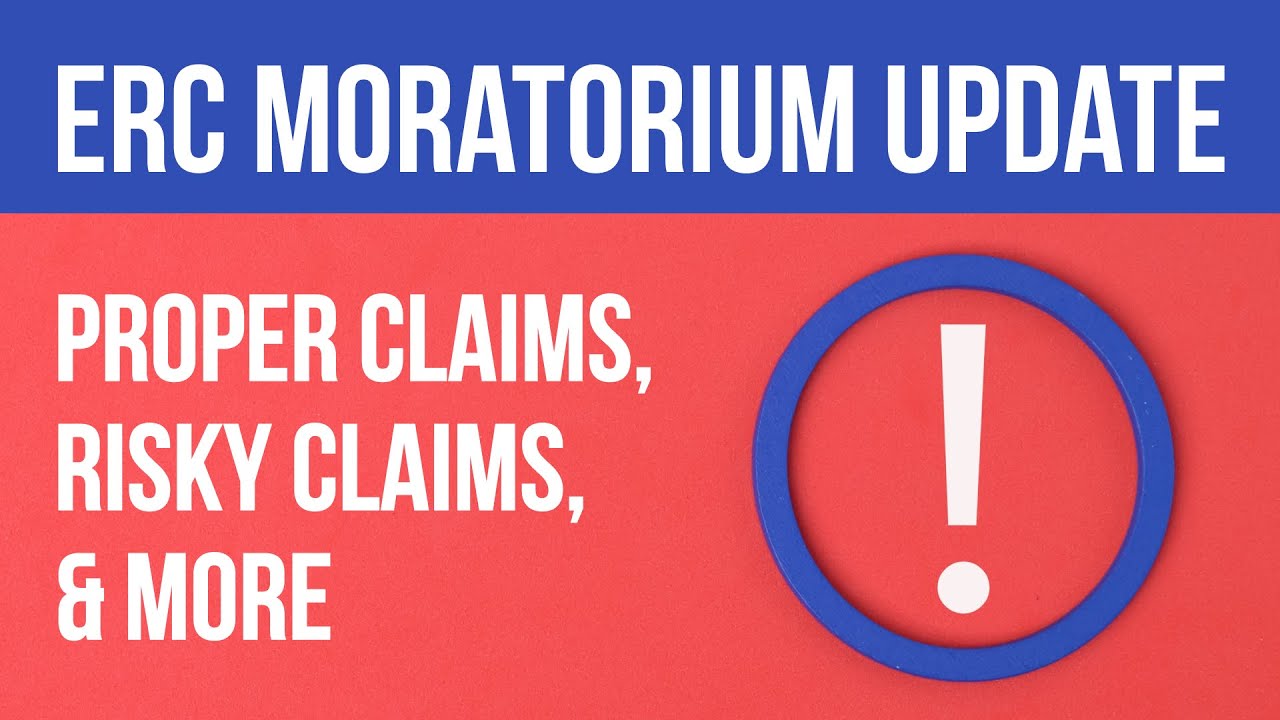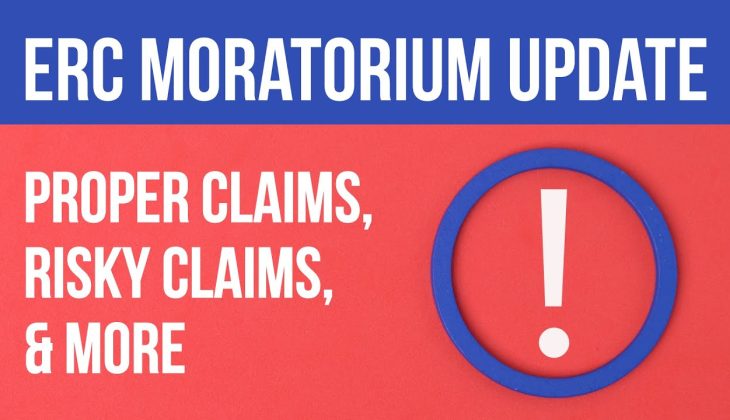Many businesses have relied on the Employee Retention Credit (ERC) to help them weather the economic storm caused by the COVID-19 pandemic. However, the IRS put a halt to processing new returns claiming the ERC on September 14, 2023. This was done to help them manage the large number of claims and to make sure that all claims were being reviewed for compliance. This guide will help you understand what the ERC moratorium means for your business and how to navigate it.

In a Nutshell
Here are the main points from this guide:
- As of September 14, 2023, the IRS has stopped processing new ERC claims.
- Businesses must ensure they have all the necessary documentation and meet all compliance requirements.
- ERC claims can still be filed, but they will not be processed until the moratorium ends.
- Businesses that received PPP funds are still eligible for the ERC.
- Working with a trusted tax professional can help businesses navigate the complexities of ERC claims.
Understanding the ERC Moratorium
The ERC was created to help businesses keep their employees on the payroll during the COVID-19 pandemic. It provided a substantial financial benefit by allowing eligible businesses to claim a refundable tax credit against certain employment taxes. However, due to the high number of claims and potential misuse, the IRS announced a moratorium on processing new ERC claims as of September 14, 2023.
This moratorium gives the IRS the chance to examine existing claims in detail and collect feedback from a variety of stakeholders, including Congress, on the direction the ERC program should take in the future. While this pause may appear alarming, it is necessary to ensure that only valid claims are processed and that businesses meet all requirements.
What This Means for Businesses
The ERC moratorium has several effects on businesses:
- Claims submitted after September 14, 2023, will not be processed until the moratorium is lifted.
- Claims that were submitted before the moratorium are being processed, but at a slower rate.
- Businesses should ensure all documentation is accurate and complete to avoid delays.
- Businesses may want to consult with tax professionals to help navigate the ERC claims process.
Understanding the Benefits and Eligibility of the ERC Moratorium
Even with the moratorium, the ERC is still a valuable tool for businesses. Understanding the benefits and eligibility of the ERC is important to fully take advantage of this opportunity.
What Are the Advantages of ERC?
There are several advantages of ERC for businesses:
- Offers a refundable tax credit against certain employment taxes.
- Assists businesses in keeping employees during economic downturns.
- Provides significant financial relief, particularly for small and medium-sized businesses.
Qualification Criteria
Businesses must meet specific criteria to qualify for the ERC:
- Has seen a considerable drop in gross receipts due to the pandemic.
- Was forced to halt or limit operations because of government mandates.
- Kept paying employees during the times of halted or reduced operations.
Common Misunderstandings
There are a few misunderstandings about the ERC that need to be clarified:
- PPP funds disqualify you from claiming the ERC – This is a myth. Businesses that received PPP funds are still eligible for the ERC.
- The ERC is only for big businesses – This is also a myth. Small and medium-sized businesses can greatly benefit from the ERC.
- The process is too complicated – The ERC claims process can be complicated, but a trusted tax professional can help simplify it.
The Employee Retention Credit (ERC) has been a critical resource for many businesses during the economic hardships caused by the COVID-19 pandemic. However, on September 14, 2023, the IRS put a moratorium on processing any new returns claiming the ERC. This move was designed to manage the high volume of claims and ensure thorough compliance reviews. This guide will help you navigate the ERC moratorium and understand what it means for your business.
Summary of Article
Here are the main points from this guide:
Learn about small business resilience stories and how they have overcome adversity to achieve success.
- The IRS has temporarily stopped processing new ERC claims as of September 14, 2023.
- Businesses need to ensure they meet all necessary documentation and compliance requirements.
- ERC claims can still be submitted, but they will not be processed until the temporary halt is lifted.
- Businesses that received PPP funds are still eligible to claim the ERC.
- Working with a trusted tax professional can help navigate the complexities of ERC claims.
How to Apply for the ERC Moratorium
Applying for the ERC may seem like a daunting task, but breaking it down into manageable steps can make the process less intimidating. Here’s a detailed guide to help you navigate through it.
Guide for Each Step
Here are the steps to apply for the ERC:
- Check if You Qualify: Make sure your business is eligible for the ERC.
- Get Your Paperwork Together: You’ll need to have all the necessary documents on hand, like payroll records and financial statements.
- Figure Out How Much You Can Get: Use the guidelines provided by the IRS to calculate how much credit you can claim.
- Make Your Claim: You can file your claim using Form 941 or Form 941-X if you need to amend a return.
What You’ll Need
It’s important to have the right paperwork for a successful ERC claim. Here’s what you’ll need:
- Records of payroll that show the wages paid to employees during the periods that are eligible.
- Financial statements that show a decrease in gross receipts.
- Any documentation of government orders that resulted in the suspension of operations.
Advice for a Successful Application
Here are some pieces of advice to make sure your ERC application is successful:
Consider reviewing these small business resilience stories to understand how other businesses have navigated similar challenges.
- Make sure to verify all computations to guarantee precision.
- Keep comprehensive logs and paperwork to back up your assertion.
- Seek advice from a tax expert to handle any difficulties.
- File your claim as quickly as possible to prevent hold-ups.
Commonly Asked Questions
Here are some frequently asked questions about the ERC and the moratorium:
What’s the current situation with ERC claims processing?
The IRS has put a hold on processing new ERC claims that were submitted after September 14, 2023. They are still processing claims that were submitted before this date, but it’s taking a bit longer than usual.
Is it possible to claim the ERC even if I’ve already received PPP funds?
Yes, even if your business has received PPP funds, you are still eligible to claim the ERC. The two programs do not exclude each other. For more details, check out IRS ERC Moratorium Update.
How is the ERC unique from other pandemic relief programs?
Unlike other programs like the PPP which offer forgivable loans, the ERC provides a refundable tax credit against employment taxes. Its main purpose is to help businesses keep employees on payroll during economic downturns.
What should I do if my ERC claim is delayed?
If your ERC claim is delayed, make sure all your documentation is correct and complete. Speak with a tax professional to identify any potential problems and follow up with the IRS for updates on your claim. For additional guidance, you can explore the importance of a business succession plan.
What will happen after I send my ERC application?
Once you’ve sent your ERC application, the IRS will take a look at it to ensure it’s correct and follows all the rules. If your application is accepted, you’ll get a tax credit that can be refunded against some employment taxes. If there are any problems with your application, the IRS will get in touch with you for more information.
Final Thoughts
The ERC moratorium has indeed thrown a curveball at businesses, but by learning the ropes and ensuring that all paperwork is spot-on, you can overcome these obstacles. By adhering to the steps provided in this guide and seeking advice from a reliable tax advisor, you can increase your odds of a successful ERC claim. For inspiration, check out these small business resilience stories that highlight overcoming adversity.
Important Points
- As of September 14, 2023, the IRS has temporarily stopped processing new ERC claims.
- Businesses should ensure they meet all necessary documentation and compliance requirements.
- ERC claims can still be submitted, but they will not be processed until the moratorium is lifted.
- Businesses that received PPP funds can still claim the ERC.
- A trusted tax professional can help navigate the complexities of ERC claims.
What to do next
Here are some next steps to consider in order to effectively navigate the ERC and the moratorium:
- Check if your business is eligible for the ERC.
- Collect all necessary paperwork and make sure it’s correct.
- Seek advice from a tax expert to assist with the application process.
- Submit your ERC claim as soon as you can to avoid any hold-ups.
- Keep up to date with any updates or changes to the ERC scheme.
Discover More Resources
For further information on the ERC and how to get through the moratorium, you might want to look at the following resources:
Information on the ERC from the IRS
For comprehensive information on the ERC, including who can apply and how to apply, visit the IRS website.
Helpful Resources
There are numerous resources available to businesses, including guides and webinars, to help them understand the ERC and apply for it successfully.
Advisory Services
Consider seeking advice from a tax expert or a specialized company like ERTC Filing Pros to ensure your ERC claim is correct and follows all the rules.
Useful Resources
For more information, here are some useful resources:

